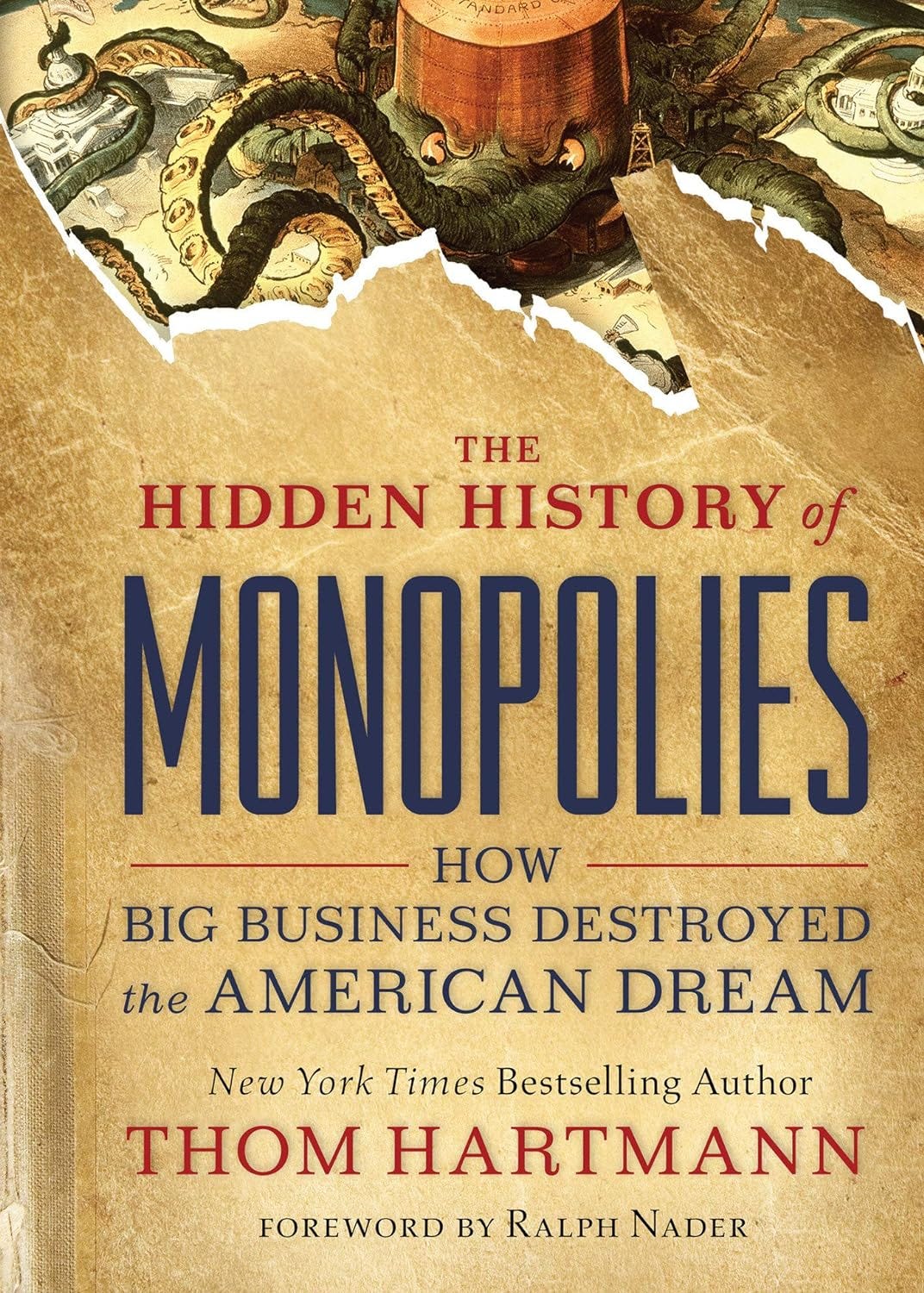Monopoly and Fascism in America Today
The Hidden History of Monopolies: How Big Business Destroyed the American Dream

Monopoly and Fascism in America Today
Today, things are even worse than in FDR’s time.
“The top 1 percent of families captured 58 percent of total real income growth per family from 2009 to 2014,” wrote economist Emmanuel Saez for the Washington Center for Equitable Growth.4
In large part, the concentration of both wealth and income has come about in the era since the Reagan presidency and the introduction of “Reaganomics.” In the 40 years prior to Reagan, income and wealth among working people was growing at a faster rate than it was for the top 1%. Since Reaganomics was instituted—a system within which we’re still operating— the wealth and income of the top 1% has exploded.
When Reagan came into office in 1981 and welcomed the monopolists back into government, everything shifted. Where we once had wide and celebrated local and regional diversity in beer brewing, for example (remember “Milwaukee’s Finest” and when Coors had to be smuggled out of Colorado?), today we have instead two corporations that produce over 90% of all the beer consumed in the United States, and one of the two, Anheuser-Busch, is now largely owned by Belgian and Brazilian investors.5
If you want to relax with the internet instead of a beer, that marketplace is also highly concentrated.
While South Koreans get internet speeds 200 times faster than what most Americans get, and pay only $27 a month for their service, Susan P. Crawford, author of Captive Audience: The Telecom Industry and Monopoly Power in the New Gilded Age and former board member of ICANN, told me that the average American consumer pays around $90 a month for a cell phone with a data plan, compared with the European aver- age of just $19 (and the coverage is better and the data is both faster and unlimited).
Why? Because the European Union doesn’t tolerate monopolies as the United States does. There are hundreds of small and feisty competitors across the continent.
On Wall Street, the 20 biggest banks own assets equivalent to 84% of the nation’s entire gross domestic product (GDP). And just 12 of those banks own 70% of all the banking assets. That means our entire banking system relies on just a few whales that must be saved at all costs from going belly up, or else the entire system goes belly up.
And consider our food industry. According to Tom Philpott at Mother Jones magazine, agriculture oligopolies exist from farm to shelf. Just four companies control 90% of the grain trade. Just three companies control 70% of the American beef industry. And just four companies control 58% of the US pork and chicken producing and processing industries.
On the retail side, Walmart controls a quarter of the entire US grocery market. And just four companies produce 75% of our breakfast cereal, 75% of our snack foods, 60% of our cookies, and half of all the ice cream sold in supermarkets around the nation.
Then there’s the health insurance market. Just four health insurance companies—UnitedHealth Group, WellPoint, Aetna, and Humana—control three-quarters of the entire health insurance market. And, as a 2007 study by the group Health Care for America Now uncovered, in 38 states, just two insurers con- trolled 57% of the market. In 15 states, one insurer controlled 60% of the market.
Since there’s no functional competition in such a market, prices continue to go higher and higher while the profits for these whales skyrocket too.
In the cellular phone market, just four companies—AT&T Mobile, Verizon Wireless, T-Mobile, and Sprint Nextel— control 89% of the market. And in the internet arena, just a single corporation—Comcast—controls more than half of the market.
As Adam Smith pointed out, and the Founders of this republic well knew, capitalism is a game that can work for the average person and the small business, but only when the rules of the game are set that way. Re-rig those rules to give disproportionate power to the very wealthy, and we slide into what Franklin Roosevelt called fascism.
Since money often equals political power, and political power can be used to rewrite the rules of business and tax law to further concentrate and enhance wealth and income for those paying the lobbyists and members of Congress, this situation not only represents the economic threat of making the marketplace more fragile and liable to crashes like what happened in 1929 but also represents a threat to democracy itself.
Most Americans would be highly offended if the NFL rules were changed to allow whichever team had the most money to have an extra three players on the field at all times. But that’s exactly what Reaganomics and its deregulation have brought us in our marketplaces; it’s the staggering difficulty that every small business in America faces today.
To understand how to fix this situation so that America’s small businesses and middle class can once again thrive, it’s important to understand the factors at play that created the vibrant, localized American economy that was the hallmark of mid-20th-century America.


